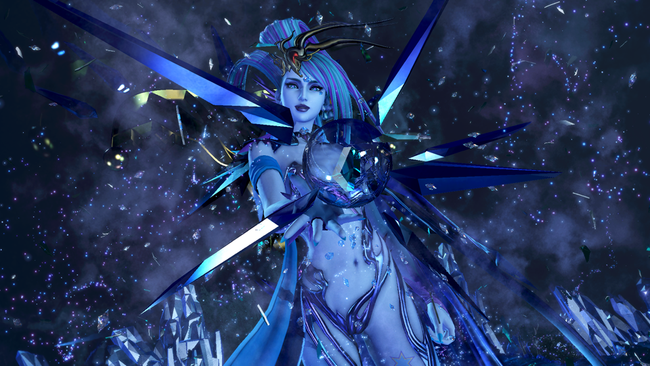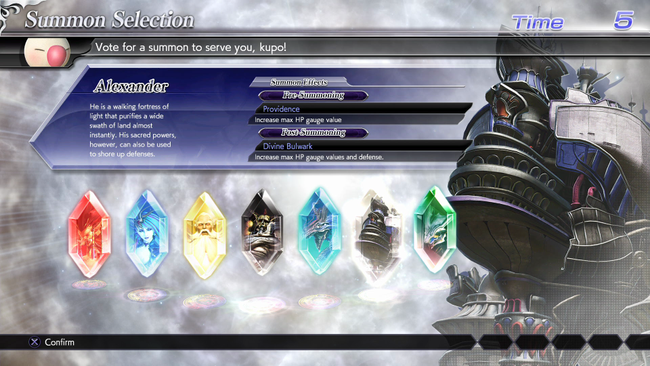
Dissidia Final Fantasy NT Summons guide: how to summon, and what they all do
It wouldn't be a Final Fantasy game without some good old summonable monsters, and in Dissidia: Final Fantasy NT they're officially referred to as Guardian Forces, a tip of the hat to how SeeD used summons in FF8. Esper, Eidolon, Summons or Aeons - whatever your term of choice, you're going to want to use them. They're powerful beasts indeed.
Summoning in Dissidia is a powerful thing that can turn the tide of battle, but as a result it also has to be earned, and then the act of summoning itself isn't exactly easy. It's governed by damage dealt, the act of summoning changes depending on what the players on the team are up to, and the exact mechanics of what each summon does once you work out how to summon them is a niche in itself.
Now Dissidia Final Fantasy NT is finally out, it only made sense to explain the various summons you'll find available to you, plus how the mechanics of summoning them work. So let's do that right now!

How to Summon a Guardian Force in Dissidia Final Fantasy NT
Summoning in Dissidia FF NT is governed by a few things - and basically, to summon you'll need to fill two specific meters, one after the other. Both meters are filled up on a per-team basis, so you'll want to coordinate and work with your team mates to fill them up.
The first of the two meters is displayed next to your health bar in the top left of the screen. You'll see the three-chunk red and blue health bars for each team, and above and below these icons you'll find one long meter with the image of your chosen GF next to it. This semitransparent, crystal-shaped meter fills up when you hit enemies with any attack, but there's also a quicker way to fill it up.
At times during battle a crystal will spawn into the world. If you redirect your attention from the battle against your enemies to the crystal, you can hit it. Hitting the crystal repeatedly will deal damage to it, and when it's taken enough damage (bravery damage is fine, for the record) the crystal will shatter. The player that shatters it will gain a huge amount of summon energy for their team, but shattering the crystal will never alone top off the GF meter - you'll need to deal some regular damage too.
To reiterate, the meter is shared across your team, so all your actions work towards it - so for instance, two players can hold off the enemy team while another attacks the crystal. Speaking of that tactic...
Summoning your GF once it's available
Once the bar is filled, all you have to do to start summoning your GF is press the touchpad on your controller. You can't just press it once, however - you need to press and hold it to charge it, and in doing so your character has to stand still and chant the summoning incantation or what have you. This leaves you vulnerable.
Summoning your GF will take between eight and nine seconds when you're doing it alone. The more players act to summon together, the faster that the summoning process happens - but when characters summon they're left vulnerable, so you'll want to coordinate with team mates in order to keep the enemy away from you while you summon.
When the summon clicks combat will briefly pause for a second and the summon will arrive: the options are Ifrit, Shiva, Ramuh, Odin, Leviathan, Alexander and Bahamut.
What each of the Summons do in battle & choosing the right one
Each of the current seven available summons has different effects, and when you choose them before you fight, you'll thus be locking yourself in to a particular back-up. First off, you need to choose a GF for your team, and they're all quite different.
Summons should be used to back up your overall play style and your team composition, both very important things to consider when you're putting together a Dissidia team. When you're faced with the GF choice screen, each one of you will select a summon for your team. If you select different summons the game will roll the dice and pick one of the three, but it's best to coordinate as a team if possible.
Each summon's effects are divided into three segments:
- Pre-Summoning Effect - This effect will be with your entire team all match based on your summon of choice.
- Post-Summoning Effect - This summoning effect will come into play once your GF has been summoned to battle and will remain in play for the rest of the fight.
- Summon Attacks - Once summoned, summons will also get out on the battlefield as a temporary party member and have a few attacks of their own (typically three attacks per summon) they can use in this time.

Ifrit
Fire beast Ifrit is a FF staple, and his effects are mostly dedicated to making it easier for you to break down foes with brute force thanks to his summoning effects:
- Pre-Summoning Effect: Warcry - this move reduces a foe's stamina when they're guarding more quickly so that you can break their guard.
- Post-Summoning Effect: Meteor Strike - this effect reduces guard stamina even more quickly still, but also boosts the strength and damage dealt by bravery attacks.
Shiva
Ice Queen Shiva is another FF staple alongside Ifrit, and she has the power of the cold. In Dissidia FF NT Shiva is focused on boosting your bravery stat and keeping that vital statistic topped up. She's ideal for teams that have a strong defense but need a more supportive and less aggressive boost to their offensive game.
- Pre-Summoning Effect: Overflow - this increases how quickly your default bravery value recovers once you're hit and it's reduced.
- Post-Summoning Effect: Algid Aura - this ability increases your bravery recovery speed further, but also boosts your default bravery value across the board.
Ramuh
Bearded god of thunder Ramuh has appeared in many forms in FF from a wise old storytelling man in FF9 to a gigantic god in FF15, and in Dissidia NT his abilities all relate to your use of the ally-buffing EX skills, special moves that you find on the Triangle button for each character. If you're a team focused on making good use of buff-based secondary abilities, Ramuh will power them up.
- Pre-Summoning Effect: High Voltage - this effect makes your buff skill gauge raise more quickly.
- Post-Summoning Effect: Catalyzing Spark - once summoned, this effect makes your buff skill gauge rise more quickly still and increases the duration of any skill effects.
Odin
Odin and Sleipnir show up in Dissidia with a very classic, iconic-style design and abilities that are befitting of a mounted warrior: all of his summoning effects are dedicated to making the player faster. If you're playing slower characters this'll speed them up a lot, or if you've a team of already-nippy folk like Zidane and Tidus it'll make them even harder to chase down.
- Pre-Summoning Effect: Greased Lightning - as you'd expect from the name, this increases how quickly your dash stamina bar recovers once depleted.
- Post-Summoning Effect: Bladeglint - this effect raises your dash gauge recovery even more, but also raises your movement speed across the board.
Leviathan
While briefly bemoaned as useless in a pivotal plot moment of FF9, Leviathan recently had a bit of a star turn as one of the gods in FF15, and she's back in Dissidia. Lightning and Water don't mix, and so she's basically the opposite of Ramuh - rather than powering EX skills that buff allys, she boosts EX skills that debuff the enemy.
- Pre-Summoning Effect: Tidal Roar - this ability will speed up the increase in your debuff skill gauge.
- Post-Summoning Effect: Sheer Misery - much as with Ramuh's Spark, this will make the debuff skill gauge rise more sharply than before and also increase the duration of your debuffs.
Alexander
Alexander is the great protector and has his most iconic moment in FF9 when the holy guardian faces off against Bahamut, rising out of the walls of a castle. In Dissidia this GF serves a similar purpose, boosting HP and defense to give you a better chance of survival.
- Pre-Summoning Effect: Providence - boosts your maximum HP value across the board for the whole fight.
- Post-Summoning Effect: Divine Bulwark - further boosts your maximum HP value, but in addition raises your defense stat too.
Bahamut
Bahamut is in many ways the most famous of the FF summons, and of course made his debut in the original FF as an NPC. The king of dragons is focused on boosting the utility of the unique EX skills that characters have, making them more powerful in a similar way to Leviathan and Ramuh for different types of EX skill.
- Pre-Summoning Effect: Frenzied Bellow - increases how quickly your unique EX skill gauge rises
- Post-Summoning Effect: Drakenscourge - boosts the speed of your unique EX skill gauge rising even more, but also increases the effect duration of these skills.